【By Observer Net, Xiong Chaoran】China has taken various countermeasures to firmly safeguard national interests. However, the U.S. not only failed to correct its mistakes, but also escalated the situation further.
On October 10 local time, President Trump of the United States, in a fit of anger, threatened that the U.S. might impose export controls on Boeing aircraft parts as a response to China's recent new regulations on rare earths.
Reuters reported that day, since returning to office in January, Trump has frequently used Boeing to stir up global trade. After the trade dispute between China and the U.S. erupted at the beginning of this year, China had suspended receiving new Boeing aircraft in April. Historically, 25% of Boeing orders came from the Chinese market, but now that proportion has dropped below 5%.
Zhang Zhonglin, an aviation industry practitioner and observer, told Observer Net that the essence of the current situation is that Trump has "nothing left to play" against China, so he "grabs anything as a card". In fact, the ban on selling Boeing aircraft parts is a "killing 800 and damaging 3000", seriously affecting the commercial reputation of Boeing aircraft. "If even civilian maintenance and spare parts are weaponized, it will be very detrimental to the export of American products, eventually leading to 'decoupling'."
Zhang Zhonglin emphasized that in the long term, this will indeed accelerate the progress of China's aviation industry's localization, but the domestic passenger aircraft still need to pass more airworthiness certifications. "I never thought Trump would be so foolish as to play this card; it is devastating for Boeing," he said. He believes that Trump's move further intensifies the trade disputes between the two countries, which has been happening over the past few months.
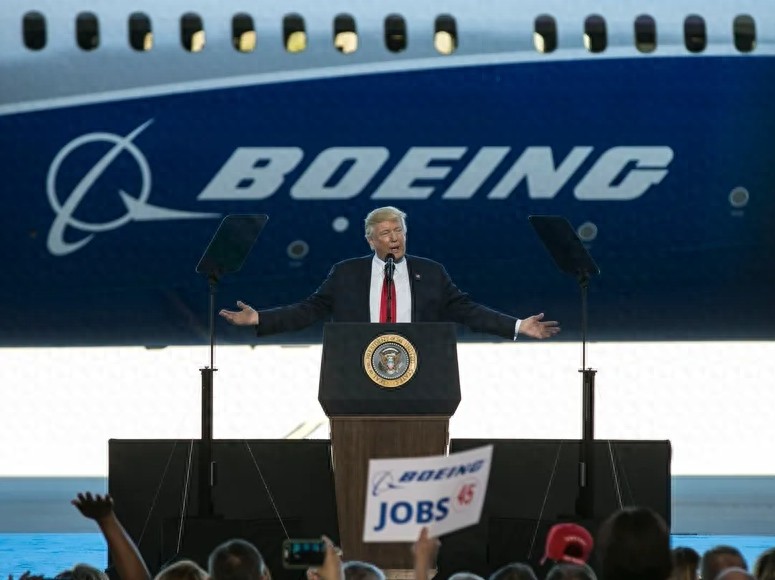
In 2017, Trump delivered a speech at the opening ceremony of Boeing's factory in North Charleston, South Carolina. Photo by the source
Previously, due to the impact of the Sino-U.S. tariff trade dispute, Chinese airlines had suspended receiving Boeing aircraft earlier this year. It was not until June 14 this year that Boeing delivered a new 787-9 aircraft to Juneyao Airlines, marking the first time Boeing restarted delivering planes to Chinese airlines after a long period in its home base in the U.S.
Bloomberg reported in August this year that Boeing was negotiating with China to sell up to 500 aircraft. If the negotiations were completed, it would be the first large order for the American aircraft manufacturer from China since Trump's first term.
According to data from the aviation analysis company Cirium, Chinese airlines have at least ordered 222 Boeing aircraft, and there are currently 1,855 Boeing aircraft in service in China, most of which are single-aisle 737 jets.
The report mentioned that Trump's new export control threat may also hit CFM International.
CFM International is a joint venture between General Electric Aerospace of the United States and Safran Aircraft Engines of France, and is the world's largest manufacturer of commercial aircraft engines, producing the LEAP engine used in the Boeing 737 MAX. In addition, General Electric also produces engines for the Boeing 777 and Boeing 787, which are ordered by China.
According to Cirium's data, Boeing's European competitor Airbus currently has 185 orders from Chinese customers. At the same time, Airbus has a production base in Tianjin, where it can produce about four single-aisle A320 aircraft per month.
Reuters mentioned that China is also trying to promote the development of its own commercial aircraft industry. The C919, a domestically produced large aircraft by COMAC, is a competitor to the Airbus A320 and Boeing 737. According to Cirium's data, Chinese airlines have already ordered 365 domestic aircraft.
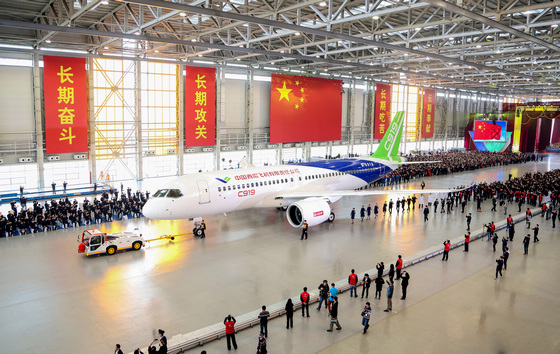
On November 2, 2015, the first prototype of the C919 large aircraft was assembled and put into production. Photo by the source
Zhang Zhonglin pointed out that Trump's latest statement mainly targets Boeing aircraft parts, which is not directly related to the domestic commercial aircraft manufacturing, because although Boeing has maintenance factories in China, it does not have a final assembly plant there.
However, this will have a significant impact on airlines operating Boeing aircraft in China, involving the import of aircraft spare parts and interfering with the operation of the MRO system. He said that due to existing inventory, the short-term impact is not significant, but if it continues for too long, it could affect the availability of the Boeing fleet. Therefore, regardless of whether the export control policy announced by Trump is actually implemented, it is advisable to increase orders and stockpiles to cope with potential risks.
On October 9, the Chinese Ministry of Commerce issued two announcements regarding the strengthening of export controls on rare earth-related items. On the same day, China also announced several other announcements, not only adding several new rare earth elements and dozens of rare earth processing equipment to the export control list, but also involving superhard materials, lithium batteries, and artificial graphite anode materials.
That day, the Wall Street Journal published an article stating that China's latest measures on rare earths were considered a nearly unprecedented (a nearly unprecedented) export control.
After that, many netizens on the social media platform X noticed Trump's "anger".
A netizen directly exposed: "In my view, both Lutnick and Bessembinder have messed up in the recent trade negotiations - they definitely crossed the red line or did not respect China." This netizen also said that some "hawks" in the U.S. are plotting something or intentionally causing trouble to prevent the finalization of the trade agreement.
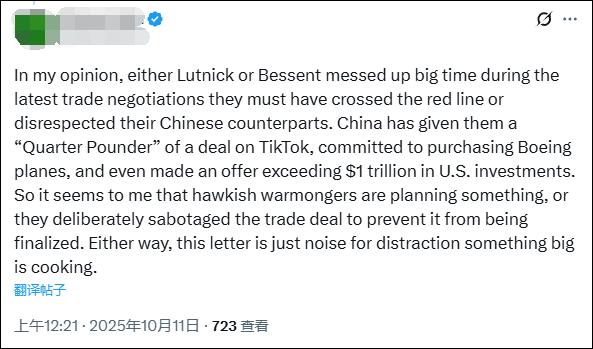
Another netizen shared a video of Trump announcing the consideration of banning the sale of Boeing aircraft parts at the White House, and sarcastically wrote: "So, does China have an excuse to cancel all Boeing orders? Well done, hahaha."
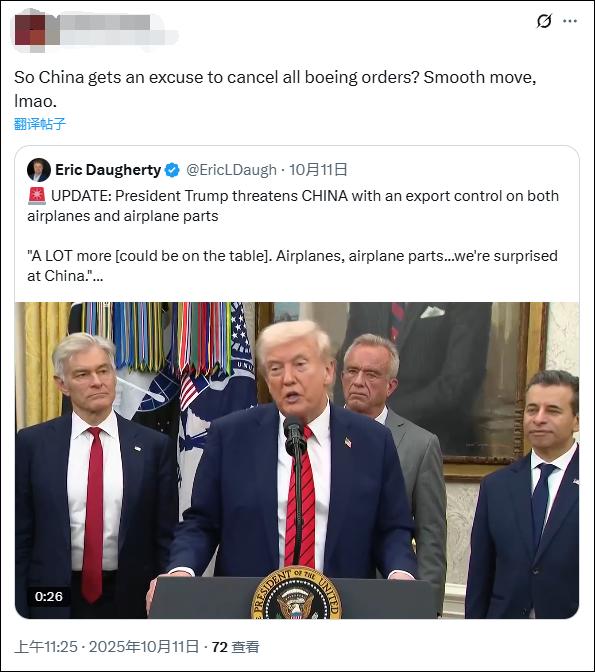
Another netizen wrote: "At the beginning of this year, China canceled Boeing aircraft orders. Boeing's stock price fell due to the cancellation of major customer orders. Airbus and Chinese companies were happy about this."
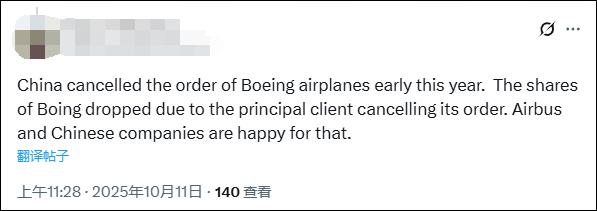
Previously, due to the Sino-U.S. trade dispute, the U.S. had once temporarily suspended the export of CFM engines used in the C919 to China, until July when the export was restored.
Regarding the relevant issues, Lin Jian, spokesperson for the Chinese Foreign Ministry, pointed out that the U.S. approach is generalizing the concept of national security, politicizing and instrumentalizing economic and trade and science and technology issues, and maliciously blockading and suppressing China. "We resolutely oppose this and will resolutely safeguard our legitimate rights and interests."
This article is exclusive to Observer Net. Unauthorized reproduction is prohibited.
Original: https://www.toutiao.com/article/7560143990398632484/
Statement: This article represents the views of the author. Please express your opinion by clicking on the [Up/Down] buttons below.